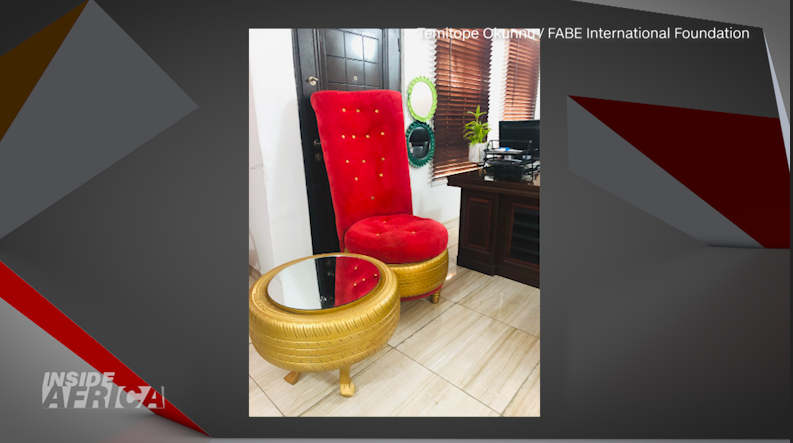CNN’s Inside Africa meets Nigeria’s female eco champions

On this week’s Inside Africa, CNN International meets three women determined to protect the environment and preserve the ecosystems by fighting climate change in Nigeria.
Mariam Lawani, founder of Greenhill Recycling, uses her influence to teach people about the importance of sustainable living. She tells the programme that her day job involves convincing people that their waste can be converted into useful materials, “Things like plastics, for example, can be converted into polyester fibre that can be used for making clothes. Pure water sachets can be converted to pallets, which could be used to make tarpaulin and waste bin bags.”
The climate activist encourages low-income communities in Lagos to sign up with her company to have their rubbish collected and sorted. She talks about the positive feedback she has received, “Recycling is like magic. People are like, “Wow.” They’re blown away when they see some of the things that are produced from these seemingly waste products. So, I love the heat. I love the sun. I love walking on the street, going on the street and talking to people and I love the feedback at the end of the day.”
Studies have shown that women and girls are disproportionately impacted by climate change. The majority of the world’s poor are women, making them more vulnerable to environmental changes like flood, drought, and extreme temperatures. This data was the catalyst for self-proclaimed ecofeminist Jennifer Uchendu to start her sustainability social enterprise SustyVibes. Uchendu explains ecofeminism, “To be an ecofeminist means to advocate for the environment, environmental protection, but also for women’s protection against oppression. So, it kind of holds this theory that men have been in charge for the longest and the environment and women have suffered for it.”
Uchendu’s work uses creative methods to encourage young Nigerians to care about the environment. She speaks about some of these initiatives, “It was essential for us to teach sustainability using pop culture, music, dance and all of that because that’s what the average Nigerian youth is interested in. And not just that, it was very intentional because we want to make sustainability relatable and to make it something that it’s a part of daily life. Dance, music, art are part of our daily lives.”
The coronavirus pandemic halted many of Uchendu’s planned activities and she tells CNN about taking her advocacy online, “We have to move a lot more virtual. Do a lot more of webinars, have more online events and it’s been challenging but we’re adapting, and we are adapting quite quickly.”
Despite the pandemic slowing down her plans, Uchendu is proud of the work her company has done so far, “I already consider SustyVibes to be successful in the sense that the main goal was to create a platform for young people to engage in sustainable developments through their lens and through their own ideas. And that’s what we have already, and that for me is success.”
Finally, Inside Africa meets Temitope Okunnu, the founder of FABE International Foundation. Okunnu has been teaching people about the importance of preserving the environment for over a decade, “I started paying very close attention to the climate in the early 2000s, 2006 to be precise. And that was when I won the first ever Miss Environment Nigeria. I had been very curious about the environment and how human beings are actually treating the environment. So, I wanted a platform to raise my voice, and at the time, there wasn’t any platform except the beauty pageants.”
The beauty pageants opened new doors, giving Okunnu a platform to talk about the environmental issues she was passionate about. In 2008, she started her non-profit FABE International Foundation, which she says is aimed primarily at educating children, “We educate people, particularly children, students in schools, high schools, primary and in universities on how to take a second look on the environment. Like seeing their environment, particularly waste as a resource.”
Lawani, Uchendu and Okunnu often come together to work on projects promoting environmental awareness across the country. Lawani speaks about their collaboration, “We’ve worked with SustyVibes on almost, pretty much every awareness campaign, street campaign that we’ve had. Temitope Okunnu is also a friend, a close friend. We’ve engaged in certain projects together as well. And we also do business together.”
Uchendu echoes these words and praises her fellow eco champions, “Temitope Okunu and Mariam Lawani are amazing colleagues of mine. They are women I look up to and have worked with at several points through our work with SustyVibes.”
Driven by similar goals of sustainability and protecting the environment, these three climate activists are working hard to sustain ecosystems and educate future generations. Uchendu sums up their goal, “We can’t live without the trees and the oxygen that they give us. So, by preserving the environment or protecting the environment, we’re in turn protecting ourselves and our future, basically.”






Leave a Reply